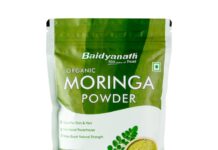Nestlé launches its Plant-based (PB) Triple Play – a plant-based version of a bacon cheeseburger – at the University of Massachusetts, to mark National Cheeseburger Day in the US.
“What better way to celebrate National Cheeseburger Day than with a new take on this iconic dish that is good for people and the planet?” said Mark Schneider, Nestlé chief executive officer. “Nestlé is excited to partner with UMass to bring our PB Triple Play to students looking for a delicious plant-based option.”
This is the first time the PB Triple Play – and any plant-based alternative to a bacon cheeseburger – will be available for foodservice customers in the United States. It will be available under the Sweet Earth brand at the University of Massachusetts in their dining halls, food truck, take-away, and online delivery, and will become a permanent menu item this fall. Additional US university operators, restaurants, and foodservice channels will be added in the months to come.
The plant-based burger patties, bacon, and cheese use a combination of natural kitchen-cupboard ingredients. Nestlé food scientists, product developers, and culinary chefs worked together to get the right taste, texture, appearance, and an excellent nutritional profile. They also worked alongside foodservice experts to tailor the products for use in professional kitchens, taking into account their specific cooking and serving requirements.
According to the press release, the PB Triple Play was developed by Nestlé in only ten months, reflecting the company’s ability further to accelerate project timelines despite the current challenging environment. It is the result of Nestlé’s deep expertise in protein science as well as its global research, prototyping, and accelerator facilities, allowing the company to rapidly expand its portfolio of plant-based alternatives to beef, pork, chicken, seafood, and dairy products.
IndiFoodBev — authentic, impactful and influential
An English-language food and beverage processing and packaging industry B2B platform in print and web, IndiFoodBev is in its third year of publication. It is said that the Indian food and beverage industries represent approximately US$ 900 billion in revenues which implies more than 20% of the country’s GDP. Eliminating the wastage on the farmside can help to deliver more protein to a higher number of the population apart from generating sizable exports. The savings in soil, seeds, water, fertilizer, energy and ultimately food and nutrition could be the most immense contribution that country is poised to make to the moderation of climate change.
To improve your marketing and grow sales to the food and beverage processing and packaging industry, talk to us. Our research and consulting company IppStar [www.ippstar.org] can assess your potential and addressable markets in light of the competition. We can discuss marketing, communication, and sales strategies for market entry and growth.
Suppliers and service providers with a strategy and budget for targeted marketing can discuss using our hybrid print, web, video, and social media channels to create brand recognition linked to market relevance. Our technical writers are ready to meet you and your customers for content.
The second largest producer of fruit and vegetables in the world is continuously expanding processing capacities and delivery systems with appropriate innovative technologies. We cover product and consumer trends, nutrition, processing, research, equipment and packaging from farm to thali. Get our 2025 media kit and recalibrate your role in this dynamic market. Enhance your visibility and relevance to existing markets and turn potential customers into conversations. Ask for a sample copy of our bi-monthly in print or our weekly IndiFoodBev eZine each Wednesday.
For editorial info@ippgroup.in — for advertisement ads1@ippgroup.in and for subscriptions subscription@ippgroup.in
Naresh Khanna – 10 February 2025
Subscribe Now











